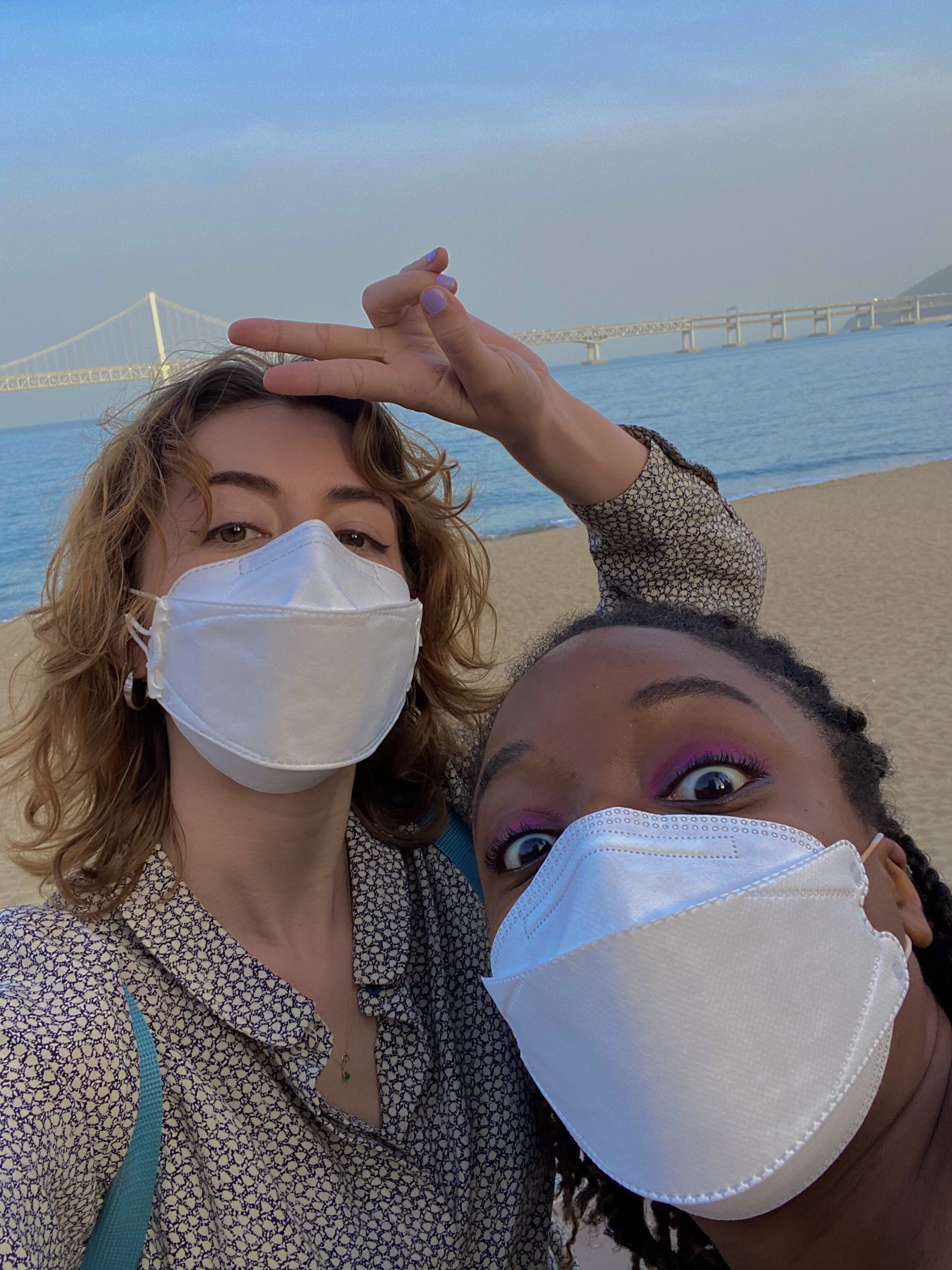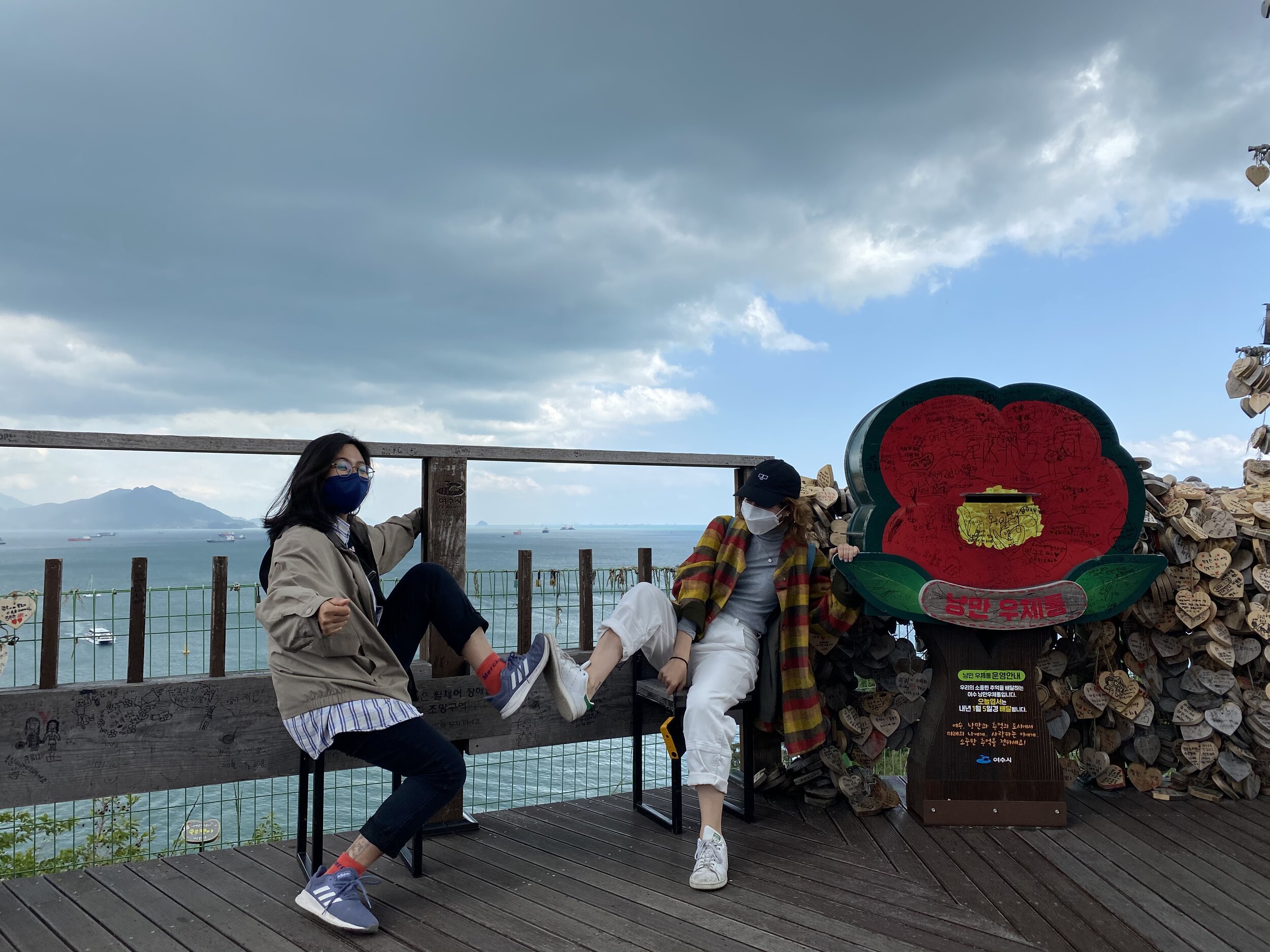I'm Moving to Spain!
First order of business: subscription emails aren’t working. I have tried everything and it’s been like this for a long time. I’m trying to find a way to fix it without shelling out $100s to Squarespace. I’m sorry for the issues! I recommend bookmarking my blog and checking whenever you feel like it until I can get this fixed.
YES. THAT’S RIGHT. FINALLY.
me in Busan, saying goodbye
I will be leaving South Korea on August 28th, returning to the US for a brief period to see my family, and then moving to Madrid, Spain to teach English at another elementary school for a year!!
This might not be a surprise to some readers—I talked about wanting to do this pretty openly last year. But then COVID hit and it all fell apart and I decided to keep my mouth shut just in case the Evil Eye or the Covid Gods wanted to humble me again.
But I didn’t give up. I still really wanted to go. After a seven month process of applying, waiting, filing paperwork and more waiting, I officially have my school assignment and my visa! IT’S DONE HALLELUJAH.
So now, let’s get to the gritty. Here are the questions I keep getting, in case you’re curious.
visiting our kickboxing coach’s farm
FAQ
What program are you in?
I’m going through NALCAP, also known as the Auxiliares de Conversación. It’s a government program that places English or French speakers in public schools throughout Spain. The program is mostly run by their regions, so I’ll be working for Madrid’s Ministry of Education. Like EPIK or JET, you’re an assistant teacher to a native teacher. In Madrid, we work 16 hours a week and usually only four days a week, while other regions might work 12.
You can find lots of info and blogs about it online. Normally, I’d love to write my own post to introduce it, but there’s so much out there already that I don’t feel like I can add anything new. However, I will be posting a guide about how to apply from Korea because…let’s just say, it gets complicated.
Why Spain?
My family is originally Spanish and still is very proud of our heritage. But I have never been before.
My grandpa speaks Spanish and I’m from Texas, so it’s past time I got fluent. I’m also dying to learn more about Spanish art, food and culture.
Do you speak Spanish?
My students all asked me this lol. It’s better than my Korean! Growing up in Texas, I’m MUCH more familiar with the language. I’m taking private classes that are totally in Spanish right now and already I’m understanding about 95%.
I’d say I’m A2 or B1, approaching conversational. Right now I’m still practicing grammar and building my vocab. The Spanish accent is also a bit challenging for me, but I’m improving.
I also studied Italian for four years, which makes learning Spanish both easier and harder. They’re extremely similar languages with similar language fundamentals, which is great! But then I accidentally switch to Italian a lot. (And sometimes Korean…brains are weird.)
Why are you leaving Korea?
Because it’s time. If you read my sad boi post from last year, you’ll see I just definitely wasn’t ready to go. I needed this third year. Now, I’ve done everything I wanted. All my friends are leaving. And I don’t want to stagnate, which I feel beginning to happen.
I’ll talk about this more in my goodbye post to Korea, whatever it ends up being. But yeah, I’ll miss Korea to the ends of the Earth and I’ll never shut up about it. But it’s time.
How much do you get paid? What are the benefits?
I will get paid 1,000 euros ($1200~) a month because I’m in Madrid. Other regions might pay only 700 because cost of living is cheaper.
Is this enough to live on? Based off lottttsss of research from Facebook pages, Youtube channels and Reddit posts, yes. If you eat out a lot and travel, no. It can be a little tight. It’s a student lifestyle budget.
Here’s the breakdown:
I do have to find my own apartment and pay my own rent, which is usually anywhere from 200-600 euros in Madrid.
Gone are the days of paid rent. Oh EPIK, I will miss thee.
I get private health insurance.
I work 16 hours a week. This doesn’t include the siesta, for which I might still need to be in/around school. AKA a bit of deskwarming, but that might work out for me.
I get one extra day a week off (Friday or Monday) and all school vacations and holidays (read: a lot of days).
Most people supplement their income with tutoring, remote work or online teaching. I’m a freelance writer and editor so my goal is to kick that into high gear.
I won’t lie, I’m a little nervous about it. It’s a big pay drop from Korea where I made around $2000 a month with no rent. But I think I gotta remember that other countries have very different costs of living and many Spaniards live off what I make working 40 whole hours. When I compare the cost of living in Spain and in Korea, some things are more expensive in Spain, but, for example, food is way, way cheaper.
I won’t get to save as much as I did in Korea, that’s for sure. But I DID save a lot here. As long as I break even with my living expenses and any travel, I’m good.
Will you get to travel around Europe?
Probably not at all in 2021, but maybe in Summer 2022. I’d love to catch those 20-euro Ryanair flights.
Instead, my focus is on traveling around Spain. I’m obsessed with Rick Steves these days and have a whole list of places to go.
How long will you stay there?
For now, just one year. I am open to two, but it depends on how much I like it.
So you’re gonna keep living abroad? Do you ever plan to return home?
Ehh not right now. I miss my friends and family a lot but I don’t see myself returning to the US for a while. I want healthcare, y’all. I’m hoping to go to grad school in Europe and, actually, I have already found my dream program in Germany. I’ll talk about this more closer to, but that’s what I’m hoping for.
What’s your school like?
It’s another elementary school, about an hour outside of Madrid (this is normal for Auxiliares). It’s an older school, and it seems like it has good reviews and excels at bilingual education.
I haven’t heard from them yet because it’s summer vacation, but I have talked to previous teachers who had good things to say.
Are you nervous?
Actually, not really. I’m a lot less nervous than I was moving to SK. I’ve proven to myself I know how to adapt and live abroad. But of course, I do have my fears.
Finding a piso (apartment) will suuuuck.
I’m a little worried about culture shocks. The mañana mañana of it all; the slower pace of life; going from a country where you can leave your purse alone for two days and not lose a thing to a country where pickpocketing could be an Olympic sport.
And—okay, don’t laugh—but many people doing this program are 22 year old fresh grads, and I’m 25 and I’m not looking for Crazy Party Gap Year 2: Electric Boogaloo anymore. Well, not as much as I used to lol. Not saying I’ll write anyone off—I wanna make friends just as much as anyone else who’s going.
I want to be open to new things, but I’ve also been living abroad for three years now. My entire adult life has been Korea. It’ll be interesting seeing how that changes—and how I change—in Spain.
But these are all pre-worries, and I can’t do much about them yet. One thing for sure is that I’m super super super excited.
gonna miss writing about korea
So what does this mean for the blog?
I know a lot of my readers are from Korea, living in Korea or hoping to move to Korea. Fear not—all my EPIK guides and trip reports and Daejeon Highlights will stay. Categories might shuffle around, though.
AND I still have quite a few Korea posts in the works. I’m still collaborating with my dear friend Abbie G on cool things around Daejeon. You will probably see these come up later, even when I’m in Spain.
My vision for this blog is to continue with the postcolonial write-ups, the guides, the trip reports and the photography. I hope that even if you have no plans to go to Spain, you find these interesting and maybe even insightful.
I’m very interested in writing about how teaching in Spain differs from SK, and of course the many cultural differences I’m sure to find. I think it’s easy for us to assume the West is all the same, especially when we compare it to places like East Asia. I want to challenge that assumption, in my own self and in general.
Thanks for reading y’all!




